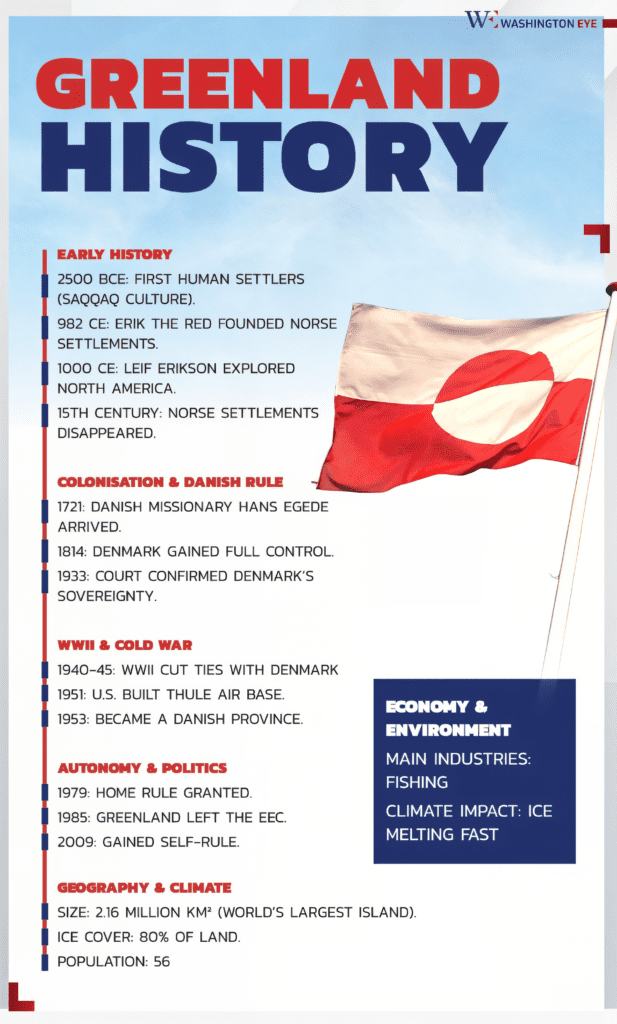In a recent address to Congress on March 4th, 2025, President Donald Trump reiterated his administration’s intent to acquire Greenland, stating emphatically, “We need it really for international world security. And I think we’re going to get it—one way or the other, we’re going to get it.” President Trump’s interest in Greenland is not new.
During his first term in 2019, he proposed purchasing the island, an idea met with firm resistance from both Greenland and Denmark. Despite past rejections, Trump has reignited his pursuit, emphasizing Greenland’s strategic importance for national and international security.
Greenland’s significance lies in its strategic location and abundant natural resources. The island is home to the U.S. Pituffik Space Base, which is crucial for missile warning and space surveillance. Additionally, Greenland possesses vast mineral and hydrocarbon resources, including rare earth elements essential for modern technologies. President Trump has highlighted these factors, asserting that control over Greenland is vital to counter potential threats from global powers like China and Russia. He believes that integrating Greenland into the United States would enhance global security and unlock economic potential for its residents.
Greenland’s Firm Rejection
In response to President Trump’s assertions, Greenland’s Prime Minister Múte Bourup Egede firmly rejected the notion of U.S. acquisition. He stated unequivocally, “We don’t want to be Americans, nor Danes; We are Kalaallit. The Americans and their leader must understand that. We are not for sale and cannot simply be taken. Our future will be decided by us in Greenland.” This sentiment reflects the island’s desire for self-determination and resistance to external control. Greenland, while an autonomous territory of Denmark, has been gradually moving toward greater independence, focusing on sustainable development and environmental preservation.
President Trump’s renewed interest in Greenland has elicited strong reactions from the international community. European leaders, including German Chancellor Olaf Scholz and French Foreign Minister Jean-Noël Barrot, have warned against any threats to Greenland’s sovereignty. Chancellor Scholz emphasized the principle of inviolable borders, stating that it applies to every country, regardless of size or power. Denmark, which maintains sovereignty over Greenland, has also reiterated that the island is not for sale. Danish officials have underscored that any decision regarding Greenland’s future rests with its inhabitants, aligning with international principles of self-determination.
The United States has a history of interest in Greenland. In 1946, the U.S. proposed purchasing the island for $100 million, citing strategic military importance during the early stages of the Cold War. However, Denmark declined the offer, and Greenland remained under Danish sovereignty. The current geopolitical climate, marked by Arctic resource competition and emerging shipping routes due to melting ice, has renewed global interest in Greenland. Nations like China and Russia have been increasing their presence in the Arctic, prompting the U.S. to reassess its strategic priorities in the region.
Economic Implications
Greenland’s vast mineral resources, including rare earth elements, have significant economic implications. These minerals are essential components in various technologies, from smartphones to renewable energy systems. The global demand for such resources has intensified interest in Greenland’s mining potential.
However, Greenland has imposed bans on new oil and gas exploration and uranium mining, prioritizing environmental concerns and sustainable development. Any external attempts to exploit these resources would need to navigate Greenland’s stringent environmental policies and respect the will of its people.
Despite President Trump’s assertive stance, acquiring Greenland without the consent of its people and Denmark poses significant legal and ethical challenges. International law upholds the sovereignty and self-determination of peoples, making any forcible acquisition illegitimate. Greenland’s leadership remains committed to determining its future, focusing on sustainable economic development and environmental stewardship. The island’s strategic importance ensures it will remain a focal point in global geopolitics, but any changes to its status will likely be driven by the aspirations of its residents rather than external ambitions.
President Trump’s recent remarks have reignited discussions about Greenland’s geopolitical significance. However, the island’s firm stance on self-determination and the international community’s support for its sovereignty suggest that any U.S. ambitions will face substantial obstacles.
The future of Greenland will be shaped by its people, under international principles of autonomy and self-governance.

















